
|
|
| WWW.WILDFIRENEWS.COM | |
FOREST SERVICE CHIEF SAYS START THINNING AROUND COMMUNITIESSEPTEMBER 13 -- GRANTS PASS, OR: The chief of the U.S. Forest Service, Dale Bosworth, said Wednesday he hopes to find common ground with environmentalists opposing President Bush's forest thinning proposal by focusing work close to communities at risk from wildfire. But environmental laws still need to be changed to speed up the work and to do it as economically as possible, according to an AP story in the Red Bluff Daily News. ''There is a lot of fear that this is about logging and about taking big trees,'' Bosworth said. ''If we can get the focus on what we leave on the land, leaving the biggest healthiest trees, getting conditions on the land where fire can play its natural role, there is common ground." Bosworth said he believes thinning should start around wildland/urban interface communities, but added that there is more fuels reduction work needed than there is budgeted funding to pay for it. Bosworth's comments came a week after the Bush administration presented its Healthy Forest Initiative to Congress. The package of bills would scale back environmental studies and eliminate appeals of logging projects that are intended to reduce the risk of wildfires on 10 million acres of federal forests over the next 10 years.
OREGON MOP-UPSEPTEMBER 10 -- GLIDE, OR: Nine days after it started, the Office Bridge Fire east of Eugene was officially declared contained at 6 p.m. yesterday. Only a few smoky spots greeted firefighters yesterday, with more expected today as temperatures increase and humidity drops, according to the Register-Guard. Crews today will mop up hot spots and address erosion concerns in burned areas; about 75 firefighters, four engines, a helicopter, and a water tender will remain on the fire. The 160-acre fire, only 60 percent contained on Friday, burned to within a half-mile of Westfir, prompting officials to issue a three-hour evacuation notice for residents of Hemlock and Westfir. The cause of the fire, which has cost an estimated $2 million to contain, remains under investigation.
About 600 firefighters were still working on the fire this morning, and infrared mapping indicates that standards for mop-up have been met. Continued light burning of interior fuels, however, is occurring, and an increase in fire activity is expected due to higher temperatures and lower RH today. All divisions are in various stages of mop-up and rehab. The fire, which started August 16, has cost $17,746,000 to contain; fire officials say the fire was human-caused but still remains under investigation. Mike Lohrey's Pacific Northwest National Team 2 will be transitioning with the ORCA Type 2 team today and will hand over the fire tomorrow. Resources remaining on the Apple Fire will be moved tomorrow to the Tiller fire camp, and both fires will be managed from there. The Tiller Complex was contained on September 4 at 68,862 acres; 794 personnel remained on the fire this morning. The Tiller Complex fires have cost $48,698,000 to date. Firefighters continued yesterday with patrol and mop-up and are rehabilitating some fireline. Crews initial attacked two holdover lightning-caused fire starts yesterday.
The Biscuit Fire remains at 499,965 acres, and the suppression cost to date is $141,170,266. The fire, which started July 13, was contained September 5. Post-fire rehabilitation projects and the methodical extinguishing of remaining hot spots on the Biscuit Fire proceeded smoothly yesterday. Today, despite drier weather, good progress is expected to continue. Approximately 58 miles of fireline rehab is complete on the east and northwest flanks of the fire. A total of 1,644 firefighters and support personnel are on the fire today; other resources include 10 helicopters, 41 engines, 79 dozers, and 41 water tenders.
MOUNTAIN FIRE NEAR GLENDALE AT 1,100 ACRESSEPTEMBER 10 -- GLENDALE, CA: A wildfire burning in the hills above Glendale has grown to 1,100 acres and is only 20 percent contained this morning. According to NBC4.TV reports, the fire was estimated at 30 percent containment last night, but it grew overnight as firefighters dug lines and burned out from the perimeter. About 600 firefighters are on the fire, along with 7 helicopters, 37 engines, and a dozer. There were two minor injuries overnight. A firefighter suffered heat exhaustion and was transported to Glendale Adventist Hospital; also, a police officer directing traffic in a barricaded area was struck by a driver. Both were treated and released. The fire, 10 miles north of downtown Los Angeles, put up a huge column of smoke that rose straight up, then bulged into a mushroom shape and drifted south over the metropolitan area. USAToday reported that Glendale, population 200,000, is bisected by the Verdugos, a brush-covered range surrounded by portions of Burbank, Los Angeles, and a number of smaller communities. Don Biggs' Type 2 team is managing the fire; containment is predicted for tonight. About 200 homes and and a radio tower are threatened. Challenges yesterday included rapid rates of spread, low fuel moisture, and intense fire behavior. Containment efforts were hindered by steep terrain, and firefighters are relying on air support for fire control. Temperatures in the 90s and winds up to 15 mph are forecasted for today. Goals today include using aircraft to control the line and tying in the open lines with dozers and hand crews. The cause of the fire is under investigation. The Glendale Fire Department says the fire has been determined to be of suspicious origin; Captain Tom Marchand says the entire area is being treated as a crime scene.
ARIZONA FIRE PROBLEM HELPS NAVAJOS RETURN TO THEIR ROOTSSEPTEMBER 10 -- CAMERON, AZ: In an old shed on Navajo Nation lands, 60 miles north of Flagstaff, two Navajo men pull ponderosa pine logs out of a truck and load them onto a conveyor belt. The conveyor moves the logs into a peeling machine and pops them out as sleek logs destined for use in traditional Navajo houses, or hogans. This prototype plant is a first step toward solving a massive problem on the nearby Coconino National Forest: fire-prone, overgrown stands of ponderosa. At least 250,000 of the Coconino's 1.8 million acres are in need of thinning and restoration. One of the biggest challenges in forest restoration, according to a report in the High Country News, is to find a way to turn the thinned small-diameter trees into marketable wood products, rather than simply cutting and burning them. "Burning the wood, rather than sending it down the road to make new products, is a type of insanity," says Coconino National Forest Superintendent Jim Golden. The hogan project may also create living-wage jobs and new housing for the Navajos; unemployment rates are near 50 percent and housing conditions are poor. Most hogans on the 17-million-acre reservation have been put together with whatever materials could be salvaged. The Cameron mill is the brainchild of a nonprofit organization called Indigenous Community Enterprises (ICE), sponsored by the Northern Arizona University School of Forestry. Funding has come from the Forest Service, regional nonprofits, and a number of foundations such as the Arizona Community Foundation.
FIRE-SETTER WANTS OUT OF HALFWAY HOUSESEPTEMBER 10 -- DENVER, CO: The former U.S. Forest Service employee accused of starting the largest wildfire in Colorado history wants the court to drop the requirement that she stay in a halfway house until her trial. The Denver Post reported that lawyers for Terry Barton filed a motion yesterday in U.S. District Court asking that terms of her release on $600,000 bond be modified to allow her to leave a Denver-area halfway house. A federal attorney said they were reviewing the motion and would file a response today. Federal public defenders said Barton is a longtime Colorado resident with a stable work history, no criminal record, a teenage daughter at home, and strong ties to the community of Florissant, where she lives.
NEW FIRE NEAR LOS ANGELES EVACUATES 30+ HOMESSEPTEMBER 09 -- GLENDALE, CA: A brushfire that started today in a wilderness park surrounded by suburbs sent a plume of smoke over the Los Angeles area and forced the evacuation of more than 30 homes. According to Associated Press reports this evening, the fire is just north of downtown Los Angeles in Brand Park. It spread quickly to 810 acres in the Verdugo Mountains, and 33 homes were evacuated along Glendale's border with Burbank. "What's running this fire is the terrain -- very steep, very heavy fuel," said Glendale Fire Department Capt. Thomas Marchant. "That's what the firefighters are working against." A report by NBC4-TV said the fire took off shortly before noon on the south face of the Verdugo Mountains, quickly climbed to the crest of the range, and burned down the north face toward neighborhoods below. About 25 miles east in the San Gabriel Mountains, the 19,375-acre Curve Fire on the Angeles National Forest is at 80 percent containment.
10 MILLION ACRES AT STAKE IN BUSH FOREST PLANSEPTEMBER 09 -- WASHINGTON, DC: The Bush administration's plan to protect forests from wildfire would suspend decades-old public-review procedures and some environmental appeals on 10 million acres and curtail the ability of judges to halt controversial logging projects. A report by the Seattle Times said the proposal seeks to reduce thick underbrush and dense stands of trees in fire-prone forests, but it also would overhaul many of the nation's forest-management practices and limit the ability of environmental groups to raise challenges. Interior Secretary Gale Norton and Agriculture Secretary Ann Veneman delivered legislation to Congress that offers the first detailed look at the "Healthy Forests" proposal Bush outlined last month. "Our nation cannot afford to continue on a course that will result in more severe fire seasons like the one we are having this year," said Veneman. But the proposal marks such a stark departure from the way federal land managers work now that critics were left breathless by its sweep. "It's outrageous — far worse than we expected," said Mike Anderson with The Wilderness Society in Seattle. He and others said the proposal reaches even further than the controversial 1995 Salvage Rider, a temporary lifting of logging restrictions environmentalists dubbed "logging without laws." That led to protests in the woods, roadblocks, and sit-ins in congressional offices. But Agriculture Undersecretary Mark Rey, who helped draft the proposal, said the problem of fire — which has ravaged more than 6.3 million acres of public and private lands this year and forced thousands to evacuate their homes — is so out of hand, it's time for new thinking. "We've got 190 million acres of land that's at risk to catastrophic fires," he said. "If this idea is so horrible to even contemplate, then either people don't believe it's a serious problem, or the level of distrust is so great we're not willing to suspend our disbelief to see if we can bite off 5 percent of the problem."
FIREFIGHTERS SAY OLD CLEARCUT SPELLED END OF SHEEP CREEK FIRESEPTEMBER 09 -- WISDOM, MT: When the Sheep Creek Fire blew through a stand of old growth, firefighters scrambled to get out of the way. The fire crowned and created 150-foot flames that shot embers a half-mile ahead of the fire. All that stood between the fire and thousands of acres of forest heavily laden with fuel, according to the Montana Standard, was a 40-year-old timber harvest unit. As the firefighters watched, the fire ran up against the old clearcut and dropped to the ground. "It was a total crown consumption fire when it hit the edge of the harvest unit," said Jim Brown, a fire behavior analyst, "and then it dropped to the ground. It was a done deal from there on." The fire's behavior didn't surprise the firefighting team. It was something they’d seen time after time on fires across the West. "Anyone in this business has seen that happen before," said Stan Benes, the Sheep Creek Fire’s incident commander. "It’s just plain old common sense." The Sheep Creek Fire began as a lightning strike. It smoldered for several days in the heavy downfall left over from a 1929 bug epidemic that killed a huge swath of trees. In some places there’s as much as 20 tons per acre of dry fuel. By the time a local Forest Service crew discovered the fire creeping around in the heavy fuels of a creek bottom, they’d already lost the opportunity for a quick strike. "There was no nearby safety zone," said District Ranger Dennis Havig. "There were no escape routes. When the initial attack force sized up the fire, all indications pointed to the fact it was going to get really active." "We knew we couldn’t safely put people in there," he added. The fire grew to several hundred acres in a matter of hours. Firefighters built a line between old timber sale units to eventually control the blaze. "It was like connecting the dots," said Benes. "We knew where it bumped into those units, we had a good chance to catch it."
WILDFIRES: A POLICY SHOWDOWNSEPTEMBER 09 -- WASHINGTON, DC: The Bush administration is pressing for changes that would speed up thinning in national forests to prevent catastrophic fires, despite Democrats' warnings that the changes would undermine environmental protections and provide a windfall to the logging industry. The proposal, which would reduce legal barriers to fuels reduction, was delivered to Congress on Thursday by Agriculture Secretary Ann Veneman and Interior Secretary Gale Norton. "This legislative proposal would give us management tools we desperately need to help get our forests and communities out of the crisis they are in," Veneman told the House Resources Committee. "It recognizes that time is not on our side" and that forest managers "must be empowered to act quickly and effectively." The debate promises to be another bruising battle, according to the Washington Post, over environmental principles between a Republican administration bent on easing government restrictions on industry, and Democrats and moderate Republicans closely allied with environmentalists who worry about wholesale logging on federal lands. The administration's Healthy Forests Initiative would restructure the rules that govern appeals on logging in fire-prone areas -- particularly making "less cumbersome" the 30-year-old National Environmental Policy Act (NEPA). The measure would waive NEPA regulations for any forest-thinning project consistent with a comprehensive strategy adopted in May by administration officials, 17 governors, local and tribal leaders, and environmentalists for managing 10 million acres of fire-prone federal forests. Bush's plan essentially would prevent environmental groups or individuals from going to court to temporarily block timber sales and forest-thinning projects
FIREFIGHTERS EXPECT TO CONTAIN APPLE FIRE TODAYSEPTEMBER 08 -- GLIDE, OR: The 17,600-acre Apple Fire should be contained by this evening, according to Mike Lohrey's Pacific Northwest Team.
"We feel confident that the 36-mile containment line established by firefighters will continue to hold," said Lohrey. "There has been a lot of hard work done by firefighters who have come from all over the United States, Canada, and Australia. Their efforts over the past 23 days have resulted in stopping this fire from further growth and spread." Crews will continue to mop up and patrol the fire area over the next couple weeks. Firefighters will also continue rehab efforts, restoring hand and dozer lines, repairing damage to roads and trails, and removing all debris within the fire area. More than 1,635 personnel are still working on the Apple and Tiller fires. Surplus crews and resources are being demobilized. A Type 2 incident management team from Oregon and northern California will begin transitioning with the Pacific Northwest Team tomorrow, and will manage the two fires. They will close the Apple fire camp on Thursday, August 12, and relocate remaining resources to the Tiller base camp. Forest closures will remain in effect until weather conditions change. Weather forecasts predict continuing dry and warm conditions over the next couple weeks, and fire danger remains high.
RAILROAD GUILTY IN STARTING FIRESSEPTEMBER 08 -- YREKA, CA: Central Oregon and Pacific Railroad has pleaded no contest to 10 misdemeanors in connection with a series of wildfires in northern California's Siskiyou County. Criminal charges were filed against the railroad, according to a report in the Eugene Register-Guard, after at least 35 fires broke out along a 40-mile stretch of tracks between the Oregon border and the city of Weed, beginning in 1995. Investigators concluded that poor equipment let sparks escape and ignite areas near the tracks. On Wednesday, Siskiyou County Superior Court Judge Roger Kosel ordered the company to pay more than $29,000 in compensation to CDF and another $175,000 to the county. A restitution hearing was set for December 12, when a judge will decide whether the company should pay part of the $450,000 in suppression costs associated with one of the fires, which burned nearly 300 acres of timber and grassland.
CURVE FIRE UPDATESEPTEMBER 08 -- AZUSA, CA: Rain and cooler temperatures have helped firefighters slow the spread of an 18,000-acre wildfire that has destroyed dozens of buildings in the Angeles National Forest.
The fire was 30 percent contained after burning 72 buildings this week about 30 miles east of Los Angeles. It was moving away from populated areas, according to a report by NBC4-TV, with full containment expected Tuesday. Among the buildings claimed by the fire were 50 summer cabins built in the 1920s and 1930s. Cabin owners Clyde Stelling, 73, and Adam Samrah, 44, said they stood in a 2-foot-deep pond on Sunday to survive 70-foot walls of flame that destroyed cabins all around them. "Six or seven hours in that pond ... all the cabins were on fire ... up and down, up and down we bobbed," Samrah told the San Gabriel Valley Tribune. "My legs hurt." The San Gabriel Valley Tribune reported that the South Mountain Hawkins Lookout, which overlooks Sheep Mountain Wilderness and Crystal Lake Recreation area, was also destroyed. More than 1,900 firefighters, supported by 13 helicopters, 54 engines, and five fixed-wing aircraft, were fighting the fire yesterday. Despite the increased level of containment, temperatures as high as 85º and humidity that dropped from Friday's 100 percent down to 25 percent have elevated the fire danger.
FLORIDA COUNTY THINS TREES DESPITE COMPLAINTSSEPTEMBER 08 -- SEMINOLE, FL: While all may not be in agreement with cutting down trees at Lake Seminole Park, the project has begun. Workers began removing pine trees last week, and will spend the next six to eight weeks thinning a 100-acre section of the county park, according to a report by the St. Petersburg Times. Removing about 40 percent of the trees will improve the forest's overall health; decades of uncontrolled growth have resulted in the trees competing for water, sunlight, and nutrients. "The long-range results are going to be very positive," said Debbie Chayet, a horticulturist for the county's park system. The downed trees, some diseased or dead, will be sold to a mill for about $20,000. Chayet says the harvest, the first of its kind in a Pinellas County park, will improve wildlife habitat and help manage invasive vegetation. A 2-mile nature trail around the forest will be closed. The project was supposed to begin in May, but county commissioners tabled it after some residents protested the plan and asked the commissioners to kill the project; they presented a petition with more than 600 signatures. The commissioners sought a third-party opinion from a specialist in urban forestry. Alan Long, an associate professor of forestry at the University of Florida in Gainesville, told commissioners the county was pursuing the right course of action.
LEARNING FROM THE WILDFIRESSEPTEMBER 08 -- STEAMBOAT SPRINGS, CO: Colorado's lawmakers don't want a repeat of the 2002 fire season. At the state and national levels, they are seeking ways to reform the way forests are managed. The Steamboat Pilot reported that Rep. Scott McInnis of Colorado hopes to avoid another devastating fire season by speeding up the decision-making process for timber removal. "Looking backward, this wildfire crisis is unprecedented in the last several decades," he said. "Looking forward, this fiery carnage is going to continue for decades unless we take bold and decisive steps." He said the current appeals process does not move quickly enough and encourages conflict rather than meaningful public input. McInnis recently introduced legislation that would remove some hurdles to thinning; he testified in a House Resources Committee last Friday on his proposal. It calls for thinning projects on more than 40 million acres of land bordering communities, watersheds, and other high-value areas. "There will be no more stalling," he said. "Thinning projects will no longer be subject to death by unending delay." Forest Service officials agree that the appeals process consumes time and resources, but some refer to it as a necessary evil. A lengthy appeals process ensures that everyone is heard and the forest is not irrevocably harmed by excessive thinning practices. Forest Service district ranger Kim Vogel said forest health suffers locally not so much from delayed thinning projects but from a lack of funding to implement those projects.
SOME ARIZONA RESIDENTS WANT MORE HELPSEPTEMBER 08 -- LINDEN, AZ: Charles Watkins of Linden says it took him nearly a decade to get clear title to his land because of a land-fraud scam in the 1970s. Later, he says, he lost $68,000 in the financial scandal involving the Baptist Foundation of Arizona. Then the state's most destructive wildfire took a 90-degree turn to the east on June 22 and incinerated his $250,000 log home, which was insured for only about three-fourths of its value. In a report on the plight of Watkins and others like him, the Arizona Republic said the remote Timberland Acres area has become the "afterthought" of the recovery effort. Timberland Acres residents claim they had to wait longer for recovery efforts like the airlift and scattering of straw to combat erosion. Navajo County Supervisor Pete Shumway said there is a shortage of governmental entities in the unincorporated Timberland Acres area for grants and other government aid to legally fund. One of those, the Linden Fire District, has its hands full because of so many other bookkeeping matters that arose from the nearly 500,000-acre fire. Rep. Jake Flake of Snowflake said he has talked with a dozen corporations that donated money to the Red Cross because of the need to have a legal organization on the receiving end. "That kind of thing isn't helping in our own backyard. The money isn't getting to the victims," Flake said. "I also know an individual who wants to donate $30,000. The only thing I can do in fairness is to divide that money up among the four fire districts in the burned area."
OREGON FIRES WINDING DOWNSEPTEMBER 07 -- GLIDE, OR: The Tiller Complex on the Umpqua National Forest has been contained, the Biscuit Fire was contained at just under a half million acres, and the Apple Fire is 95 percent contained this evening at 17,600 acres. The Apple Fire is still active in interior islands within the fire perimeter, and larger fuels are still burning, with creeping and smoldering fire and occasional torching. All divisions are in various stages of holding, mop-up, and rehabilitation. A fireline supervisor was involved in a motor vehicle accident on Hwy 138 today. The accident is under investigation; the driver was uninjured but was sent to the hospital as a precaution. Tomorrow's weather will be warmer, with temperature around 80º and RH of about 20 percent. Light northwest winds are predicted, and fire managers expect continued light burning of interior fuels. Initial attack resources responded to two new starts after yesterday's lightning, one east of the Tiller Complex and another at the upper end of Steamboat Creek.
WEATHER SLOWS SOUTHERN CALIFORNIA FIRES
The fire destroyed four homes earlier in the week and cost $2 million. The cause was under investigation. Rain and clouds also helped firefighters on the 18,254-acre Curve Fire on the Angeles. Studebaker's Type 1 team is on the fire, which has spread into the San Gabriel and Sheep Mountain Wilderness Areas. Crews are building line on the west and northeast flanks, and they contained numerous spot fires on the opposite side of Highway 2. About 200 buildings are threatened, and the fire's at 30 percent containment. Full containment is expected Tuesday. "This is a tough one," said Susie Wood, information officer for the Forest Service. "It's in such rugged steep terrain that it's hard to get a line around it." Investigators suspect the fire was started by candles used in an animal sacrifice ritual. Parts of a dismembered goat and other animal remains were found inside a ring of rocks in the canyon where the fire began Sunday. No arrests have been made.
MONTANA FIRES UPDATESEPTEMBER 07 -- BILLINGS, MT: Crews battling two fires in Montana took advantage of calm weather yesterday. Two days of dry, windy conditions had kept crews from getting close to the 5,400-acre Cow Creek Fire, according to the Missoulian. "Today they can do that safely," fire information officer Linda Williams said. "We always put the crews' safety first." She said more crews arrived yesterday, bringing the total number of personnel on the fire to about 190. Williams said the fire could be contained by Sunday if weather continues to cooperate. The fire was burning between the Yellowstone River to the north and Highway 421 to the south. It briefly jumped the highway at the Stillwater-Carbon County line, but was stopped by retardant drops. In southeast Montana, the Kraft Spring Complex, started late last week by lightning and burning in dry grass and pine trees about 30 miles southeast of Ekalaka, grew to more than 55,000 acres but was about 40 percent contained Friday night. The Bear Trap Fire on the Beaverhead-Deerlodge was contained at 143 acres.
SMOKEJUMPER BREAKS LEG ON COLORADO FIRESEPTEMBER 06 -- CARBONDALE, CO: A smokejumper assigned to a new wildfire in northern Pitkin County suffered a broken leg and is hospitalized at a Grand Junction hospital. Fire information officer Steve Ambrose said Matt Alexander, 29, of Redding, California, broke his leg yesterday afternoon while battling a 120-acre fire about six miles southwest of Carbondale. According to thedenverchannel.com, Alexander was reported in good condition. The fire is burning in oak brush and Douglas-fir on the White River National Forest; 44 people are assigned to the fire. Another fire about 45 miles east of Meeker grew by about 500 acres to 16,300 acres as fire activity increased yesterday. Ambrose said suppression efforts were under way where the Big Fish Fire had burned outside the wilderness area, but officials otherwise were monitoring the blaze. More suppression will be ordered if the fire spreads farther outside the wilderness area. The nearby Lost Lakes fire remained at 5,184 acres, and the Mount Zirkel Complex of two wildfires north of Steamboat Springs is at 31,014 acres.
ONLY 16 PERCENT OF BISCUIT FIRE AREA IS BADLY BURNEDSEPTEMBER 06 -- GRANTS PASS, OR: The largest wildfire in the nation this year and the biggest in Oregon in more than a century has been declared totally contained -- at 499,968 acres -- nearly two months after being ignited by lightning. Crews made the final connections of the 405-mile perimeter of roads, dozer lines, and handlines at three points on the western flank on Thursday evening, according to an AP report in the Eugene Register-Guard. "We are anticipating not having full control of this 500,000-acre fire until we get a season-ending rain event," said information officer Betty Higgins. "Folks need to understand there is still quite a bit of unburned vegetation in the middle of this." Costs on the fire now total $113.1 million, the most expensive in the nation this year. The average date in Oregon for enough precipitation to control the fire is October 11. A satellite map for assessing rehab efforts shows 19 percent of the fire area, about 9,600 acres, was unburned, and 41 percent, about 205,000 acres, burned at low intensity, leaving green trees standing and healthy, while clearing out brush and small trees. Only 15.7 percent, about 78,500 acres, burned at a high intensity, leaving little but ash and charcoal behind. About 22.6 percent, or 113,000 acres, burned at moderate intensity, where underbrush and most trees were killed, but their needles remained intact. A BAER team has been assessing the fire area and is developing a plan for controlling erosion. The team's assessment report is due September 15, and all work is to be done by November 1. About 90 percent of the fire area will be left alone, because it is too steep to safely work on and there is little that people can do that will change the course of nature.
SANTERIA WORSHIPPERS STARTED CURVE FIRESEPTEMBER 06 -- LOS ANGELES, CA: A wildfire on the Angeles National Forest that forced thousands of holiday campers to flee the fast-moving flames was ignited by candles used in an animal sacrifice ritual, according to a Reuters report in iwon news. U.S. Forest Service investigators initially believed that lightning started the 17,000-acre Curve Fire, but after inspecting the point of origin, clues emerged that human activity was involved. "The Curve Fire investigation team has concluded candles associated with a ritual involving the use of fire and animal sacrifices started the fire," said Rich Phelps, a fire information officer. The Angeles National Forest, home to the San Gabriel Mountains, has long been a popular site for practitioners of Santeria, a Westernized form of African deity worship. Santeria rituals commonly include the sacrifice of goats, chickens, and other small animals, and take place in a forest, which is considered a sacred place akin to a house of worship, experts said. Law enforcement officers routinely find tableaus of dead animals, votive candles, and shredded clothing in secluded spots throughout the Angeles National Forest, said Deputy David Smail. "They go off into the woods and do their little thing," Smail said. "It's hard (to catch them) because they sometimes have lookouts."
CHICKADEE STARTS FIRE NEAR DEXTERSEPTEMBER 06 -- EUGENE, OR: Firefighters are all but finished with three small wildfires in Lane County, but hazardous steep terrain slowed progress Thursday on the area's biggest blaze. The Eugene Register-Guard reported that the 160-acre Office Bridge Fire near Westfir is 60 percent contained; a three-hour evacuation notice remains in effect for local residents. Crews mopping up near the old Hines Lumber Co. Mill site came across a second possible chemical dump burned in the fire. They summoned the Regional Hazardous Material Response Team from Eugene to analyze the debris for possible danger to firefighters. Results of their tests weren't available Thursday. Fire officials determined that a chickadee shorted out an electrical wire to start a fire Wednesday on private land south of Highway 58 along Harolds Road. The fire grew to 2.4 acres before it was controlled by helicopters and volunteers from the Dexter Rural Fire Department.
MONTANA FIRES UPDATESEPTEMBER 06 -- BILLINGS, MT: Gusty winds pushed a fire in southeast Montana beyond its lines today, according to the Billings Gazette. Firefighters worked to regain lost ground as the weather forecast called for more winds. Meanwhile, cooler temperatures and morning rains lifted the spirits of crews battling another fire in southern Montana. The Cow Creek Fire, 2,700 acres at 20 percent containment, is about seven air miles northwest of Joliet. Gray's Type 2 team assumed command yesterday afternoon; fire behavior's included rapid rates of spread, extreme fire behavior, and long-range spotting. In southeast Montana, the Kraft Springs Fire, started late last week by lightning and burning in dry grass and pines about 30 miles southeast of Ekalaka, grew to more than 52,000 acres and was at 25 percent containment this morning. "Our big fight with this thing has been the dry fuels and strong, erratic winds," said information officer Pat Cross. He added that cooler, wetter weather expected today probably wouldn't arrive until the weekend. Swope's Type 2 team is managing the fire. Eight structures remain evacuated today, and winds of 10-15 mph continue to test firefighters' efforts. Structure protection remains in place with county volunteer engines, and progress is being made on all flanks, with the highest fire activity on the northwest and southeast flanks. Nearly 570 fire personnel are at the blaze, and more are arriving. North of Ennis, the Bear Trap Fire is zero percent contained at 143 acres. Two crews and two engines are working the fire, which started on September 4. Firefighters are concerned about the possibility of high winds, which could push the fire over a ridge and onto a benchtop.
THE BISCUIT'S ALMOST TOASTSEPTEMBER 05 -- GRANTS PASS, OR: Oregon's largest fire in history is now 98 percent contained. With the help of cooler temperatures and higher humidity, firefighters were able tie the containment lines together; they're now working to secure the firelines.
A Burned Area Emergency Rehabilitation (BAER) team has been assembled, and BAER information officer Erin Connelly said their objectives include determining immediate resource needs and human health and safety concerns. The team will work to stabilize soils, control erosion, and monitor the effectiveness of emergency treatments. They will finalize an initial assessment by mid-September and take on any needed actions before the first of November. Local officials with the USFS and BLM were joined on the BAER Team Monday by Greg Kuyumjian from the Santa Fe National Forest in New Mexico. Kuyumjian coordinated BAER teams this summer for the Hayman Fire in Colorado and the Rodeo-Chediski Fire in Arizona. He also coordinated rehab efforts in 2000 for the Cerro Grande Fire in Los Alamos, New Mexico. The Bear Camp Road remains closed; snags and other hazards are being removed. All other roads in the fire area remain closed, as heavy equipment and crews are working in the area for rehabilitation. The BAER team will finish their analysis today in Zone 1. In Zone 2 a Type III team from the Six Rivers National Forest is assigned. Cool temperatures and higher humidity in Zone 3 kept fire behavior low and allowed firefighters to tie containment lines together. Mop-up and rehab continues, and the Curry County Sheriff's Department retracted pre-evacuation advisories for Pistol River, Upper Gardner Ridge, and Wilderness Retreat. All other closures are still in effect. A public meeting is planned for tonight at the Azalea Middle School in Brookings for 7:00 pm. The only active fire in zone 4 is in the Lawson Creek drainage; islands continue to burn well within the fire perimeter. Some individual tree torching was observed, but fire behavior yesterday was mostly low-intensity backing fire. Mop-up is proceeding well in other parts of the zone, and suppression-related rehabilitation is continuing. Cooler weather is expected to last through the week, with daytime temperatures ranging from 54º to 67º and higher RH from 41 to 54 percent.
SENATORS PROPOSE BOOSTING SPENDING TO COMBAT DROUGHT, WILDFIRESSEPTEMBER 04 -- WASHINGTON, DC: Senators on Wednesday introduced what could be a $5 billion package to help the nation's farmers and ranchers cope with a fierce drought, mounting a campaign-season challenge to President Bush. An AP story in the Red Bluff Daily News said that Bush last month declined to support added drought assistance in the wake of last May's enactment of a $190 billion, six-year farm bill. Last week, Bush requested an extra $825 million to battle this year's wildfires, one of the worst outbreaks on record. A bipartisan group of senators proposed language Wednesday that would provide that money, and it is expected to sail through the Senate. This year's wildfires have burned more than 6 million acres, nearly double the average for the past decade's fire seasons. Of the money, $636 million would go to the Forest Service and $189 million to the Bureau of Land Management. The extra firefighting money was an amendment to a $19.3 billion measure financing the Interior Department and federal cultural programs that the Senate debated Wednesday. The bill already contains $2 billion for battling wildfires, $200 million less than the House version. Another fight is expected over a plan by Western senators to let federal officials remove dead wood and sick trees from national forests to prevent wildfires. Bush has proposed a similar plan, which many environmentalists complain would allow more logging on federal lands. CRAIG LAUNCHES FIRE PLANSEPTEMBER 05 -- COEUR d'ALENE, IDAHO: Idaho congressmen are introducing proposals to reduce fire hazards on some of the forests most at risk, according to a report by the Coeur d'Alene Press. U.S. Sen. Larry Craig is proposing an amendment to the Interior Appropriations Bill that would exempt 10 million acres from environmental restrictions and judicial review. His plan would give highest priority to projects near urban populations, municipal watersheds, and areas affected by disease, insects, and wind damage. So far this year, wildfires have burned 6.3 million acres. About 2,500 homes have been destroyed, and 25 people have died fighting wildfires. That's more devastation than was wreaked by Hurricane Andrew in Florida in 1992. "If this had been Hurricane Andrew," said Craig, "we and the full force of the government would be out there today, helping these people, rebuilding these homes and trying to solve the problem.
JUDGE RULES BARTON'S CONFESSION ADMISSIBLESEPTEMBER 04 -- DENVER, CO: A federal judge ruled today that Terry Barton's statements about starting the 137,760-acre Hayman Fire are admissible and can be submitted in the case against her. According to the denverchannel.com, Barton's attorneys tried to get the confession suppressed, saying that Forest Service investigators didn't advise her of her right to remain silent before she made her statements. One of the investigators testified that there was no need to advise her of her rights because she was not under arrest at the time. Barton faces four federal charges, including arson, for allegedly starting the largest wildfire in Colorado history that destroyed at least 133 homes and cost more than $39 million to fight. She pleaded not guilty to the charges. The Hayman Fire started June 8 north of Lake George, Colo., and took almost a month to contain. It still has not been declared officially out. In her statements to investigators, Barton claims to have burned a letter from her husband in a campfire ring. The U.S. attorney also says Barton voluntarily handed over a matchbook from her truck, telling investigators the missing matches were the ones she used to start the fire. She was fired from the Forest Service on June 22; her trial is scheduled to begin Jan. 6.
TILLER FIRE CONTAINEDSEPTEMBER 05 -- GLIDE, OR: Incident Commander Mike Lohrey last night declared all the fires on the Tiller Complex 100 percent contained. "Solid firelines have been established around all the fires," he said, "and we feel confident that we can contain the fires within their current boundaries." He added that the hard work of the crews on the fire over the past 55 days was appreciated by the incident management team. The complex of fires, about 25 miles east of Canyonville, was ignited by lightning on July 12 and burned 68,862 acres. Crews now are patrolling for hot spots and mopping up along the perimeter, and Lohrey said that will continue until the fire is controlled -- when the team is confident that there's no risk of the fires escaping the containment lines. Infrared flights are continuing in an effort to locate hot spots. Firefighters will be mopping up to within 300 feet of the containment lines, and a major rehabilitation effort is under way.
LAST BISCUIT EVACUATIONS LIFTEDSEPTEMBER 04 -- GRANTS PASS, OR: The Curry County Sheriff lifted the final evacuation warning today on homes threatened by the Biscuit Fire, according to Associated Press reports, and residents of about 30 rural homes were finally allowed to unpack and relax. "Getting back to normal would be wonderful," said Sandra Brugger, who owns the Chetco River Inn east of Brookings and has been living with helicopters and fire crews in her yard the past month. "This means we can move our papers and other important things back home." The scattered rural homes were all within a few miles of the Biscuit Fire, which stood at 499,937 acres after being ignited July 13 by lighting. The massive firefighting effort, at one point the top priority in the nation, kept the flames from moving into the Illinois Valley communities of Selma, Kerby, Cave Junction and O'Brien, home to about 17,000 people. The fire was 92 percent contained last night at 499,937 acres. It remains the biggest in the nation this summer.
AIRBORNE ASSAULT KICKS OFFICE BRIDGE FIRESEPTEMBER 04 -- WESTFIR, OR: The Office Bridge Fire grew by just 10 acres on Tuesday, totaling 140 acres, as cooler weather arrived to bolster efforts of 357 firefighters and aerial crews working on steep, rocky terrain north of the North Fork of the Middle Fork of the Willamette River. The Eugene Register-Guard reported that residents of nearby communities remain under a three-hour evacuation notice. A 12-hour bombardment by three helicopters and two airtankers on Monday resulted in 25 percent containment on the fire, according to fire information officer Bernie Pineda. Three helicopters dropped 282,000 gallons of water from the river. Airtankers based out of Redmond made nine retardant drops totaling more than 20,000 gallons of retardant. "Given the record-dry fuel conditions we face, a rapid response by ground crews and aggressive use of air resources are critical to our ability to protect adjacent communities and get the job done safely," said incident commander Dale Gardner. Falling snags and rolling rocks added to the danger for firefighters. One injury was reported Tuesday when a firefighter was struck by a rock that tore loose and rocketed down a steep grade. According to fire information officer Peter Frenzen, crews working the night shift are assigned to areas on the east and west sides of the fire on flatter ground with fewer hazards from falling debris. "Things that are falling are terrifying enough when you can see them coming," he said.
SQUIRREL FIRE EVACUATES SHASTA COUNTY RESIDENTSSEPTEMBER 04 -- WHITMORE, CA: For the second time in two days, flames forced Shasta County residents to evacuate near the foothill community of Whitmore. The Redding Record-Searchlight reported that the wind-driven fire spread to 250 acres as a second fire ignited by the first scorched 75 acres. Winds up to 17 mph pushed the blaze north, threatening homes along Fern Road East, which links Whitmore with the neighboring towns of Fern and Oak Run. About 540 firefighters were on the fire, backed up by helicopters and airtankers dropping water and retardant. The fire crowned in the trees as residents watered down yards and cut firebreaks. Though a large fire moved through the area about a decade ago, thick brush 6 to 8 feet tall provided plenty of fuel for the fire. Airtankers were grounded at dusk, but were expected to continue fighting the fire today. A CDF Type 1 team is assigned; extreme fire behavior with spotting was observed yesterday. Structure protection is in place for 500 residences, several commercial properties and 200 outbuildings. One residence was confirmed lost; the fire last night was zero percent contained at 325 acres.
APPLE/TILLER UPDATESEPTEMBER 04 -- GLIDE, OR: The 69,252-acre Tiller Complex is listed at 95 percent containment this morning, and full containment is expected today. Firefighters will continue to mop up, patrol, and initiate rehab today, and will be monitoring for hot spots within the fireline. The Umpqua National Forest has finished a rehab plan for the complex and is considering the use of a Burned Area Emergency Rehabilitation (BAER) team to prepare for secondary rehabilitation to protect life and property.
The Apple Fire is 85 percent contained this morning at 14,160 acres. Weather conditions have moderated the fire behavior; mostly minor surface fire with occasional torching was observed yesterday. Burnout continued yesterday in three divisions, and all other divisions are being mopped up. The fire received light drizzle yesterday, and that, combined with higher relative humidities and lower temperatures, will help with mop-up and holding. Further burnout operations, however, will be limited by weather conditions. Crews today will continue to burn out where possible, and substantial mop-up is planned. A portion of the 27 Road on the southwest side of the fire will be treated today for dust abatement. Also, personnel leaving the fire, whether demobilizing or headed for the Tiller Complex, are asked to stop at the weigh station west of Glide for a wash to eliminate transport of noxious weeds. On most areas of the fire today, patrol and mop-up will occur; rehabilitation operations including removal of debris have begun. Initial attack resources are being staged in the event they are needed.
SOUTHERN CALIFORNIA FIRE EVACUATES LEONA VALLEYSEPTEMBER 03 -- PALMDALE, CA: On the north end of Los Angeles County, a fire near Leona Valley this afternoon burned more than 800 acres of brush and forced the evacuation of several homes as it raced uphill. Flames ringed a half-dozen homes on the edge of the Angeles National Forest; about 600 firefighters worked to save the homes. The fire's burning on both sides of Bouquet Canyon, and the Canadair CL-415s leased by Los Angeles County are working on the fire. Several homes are in imminent danger, according to a report by NBC4-TV; the station has a slide show online with photos of the Leona Valley Fire.
BUS ACCIDENT ON THE TILLER COMPLEXSEPTEMBER 03 -- GLIDE, OR: The driver of a crew bus carrying 19 Canadian firefighters temporarily lost control of the vehicle on the Little Boy Fire on the Tiller Complex this morning. As a precautionary measure, six firefighters were transported to Mercy Medical Hospital in Roseburg for evaluation; two other firefighters with minor injuries were later taken to the hospital. All have been released. The 11 others on the bus remained at the Milo base camp for evaluation and de-briefing. "Safety is always the number one priority for the Pacific Northwest Incident Management Team 2 — in all aspects of incident management," said Mike Lohrey, incident commander. "We constantly remind incident personnel of the need to follow safe practices while driving to and from the fireline." An accident investigation team has been mobilized and includes members of Lohrey's team along with representatives from the Tiller Ranger District, Douglas County Sheriff's Department, and the bus company.
MIST ON THE APPLESEPTEMBER 03 -- GLIDE, OR: Firefighters on the Apple Fire and Tiller Complex were greeted with cool mist and clouds this morning, but hope to still get in some burning to reinforce lines on the Apple Fire. Even though cooler temperatures and showery conditions are expected to continue through Thursday, the burnouts necessary to contain the fire could still be successful in areas of heavy timber where precipitation is blocked from reaching the ground by heavy timber canopy above.
Yesterday afternoon the fire put up a good plume of smoke with active burning along the flank between Calf Creek and Twin Lakes, with very active fire behavior in old growth noble fir. Most of the fire, however, burned beneath the canopy. High temperatures yesterday were 92º at the Tiller incident command post, 87º at the Apple ICP, 78º recorded by FIRE RAWS #15 on the Tiller, and 83º recorded by FIRE RAWS #6 on the Apple Fire. Low humidities ranged between 24 percent and 29 percent on both incidents. Forecasted temperatures this afternoon are a high of 78º at fire camp and a low of 45º tomorrow morning. Firefighters were cautioned at this morning's briefing to be prepared for wind gusts to 20 mph on the ridges this afternoon; though fire behavior should be reduced by the cooler conditions, torching is still possible, especially on the southwest/west aspect slopes. Burning index has dropped from the low 60s to 54 for today. Fire-weakened trees and falling snags are still a concern in some areas of the fire, and firefighters were urged to be cautious, particularly in areas where crews haven't yet worked. The Apple Fire is now 75 percent contained at 13,595 acres and the Tiller Complex is 95 percent contained at 69,252 acres. Full containment on the Tiller is expected by tomorrow. Fires already contained in the complex include: Tallow, Red Mountain West, Gemstone, 2040, Quarter, Rendezvous, 2035, 2018-A and Bloomer fires. Containment for the Apple Fire is predicted for Thursday.
FREEWAY FIRE IN CASTAIC NEARS 1,000 ACRESSEPTEMBER 03 -- SANTA CLARITA, CA: Erratic winds and scorching temperatures fanned a wildfire to nearly 1,000 acres Monday, prompting the closure of Interstate 5 and creating a traffic nightmare for homebound holiday travelers. The Pasadena Star-News reported that winds gusted to 15 mph and temperatures were over 100º as 550 firefighters fought the Freeway Fire. One hundred residences remain threatened. "We were seeing some really aggressive fire behavior," said Roland Sprewell, a Los Angeles County fire inspector. "We had flames 100 feet high. It was a very dangerous situation." The fire was reported Sunday afternoon; it died down overnight and then took off again early yesterday. "The fire was extremely active, as if it was burning in the middle of the afternoon," Sprewell said. "And that's unusual for so early in the morning." Three firefighters were treated for heat exhaustion and one for a minor knee injury. Heavy smoke and visible flames prompted the California Highway Patrol to close down I-5 in both directions for most of Monday morning, creating a 9-mile-long traffic jam. "It's just a mess." said CHP Officer Doug Sweeney. "The traffic is probably the worst it's ever been." NBC4-TV in Los Angeles reported that another fire in Bouquet Canyon north of Santa Clarita has spread over 100 acres; it's moving fast and in two directions, uphill toward Palmdale. About 250 firefighters are on the fire, and Canadian super-scoopers are dropping water on the fire — the first time this season that the leased CL-415s have been dispatched on a fire.
BISCUIT UPDATESEPTEMBER 03 -- GRANTS PASS, OR: The Biscuit Fire last night was at 92 percent containment and 499,937 acres. Warm and dry conditions, steep terrain, lack of natural barriers, and poor humidity recovery last week postponed the expected containment of the fire. Joining of the containment lines is on track, and containment is expected Friday. There is still about four miles of fireline to build, and interior islands continue to burn in all zones. The BAER team is expected to finish their analysis by Thursday in zone 1. They are ground-verifying satellite imagery on burn severity. In zone 3, crews are using thermal imaging maps and walking the fire areas by grid to help identify hot spots. The remainder of the southern section of Zone 3 has remained cool, with mop-up and rehab progressing well. A public meeting is planned for 7:00 p.m. Thursday at the Azalea Middle School in Brookings. The only active fire in zone 4 is in the Lawson Creek drainage; islands continue to burn well within the fire perimeter. Some individual tree torching was observed, but mostly it was a low intensity backing fire. There are no restrictions on tour boats, fishing, or rafting traffic on the Rogue River. The Quosatana Campground boat ramp is open, but the Quosatana campground will remain closed for rehab. Lobster Creek and Foster Bar boat ramps are both open. More information is available at www.biscuitfire.com
MORE WINDY WEATHER ON THE CURVE FIRESEPTEMBER 03 -- AZUSA, CA: A wildfire that forced thousands of people to flee campgrounds in the San Gabriel Mountains during the Labor Day weekend had grown to 14,429 acres by this morning, according to a report by USAToday; the fire started Sunday about 30 miles northeast of Los Angeles, and was 5 percent contained last night. About 7,000 campers were forced to leave behind their tents, clothing and food when the fast-moving blaze headed for them. The fire destroyed 14 structures, including two homes of forest personnel. More windy weather with temperatures near 100º was forecast for today, and firefighters are working on steep, forested hillsides at elevations near 7,000 feet. Sections of state Highways 2 and 39 remained closed Tuesday and were being used only by fire engines carrying reinforcements, according to a report by the San Diego Union-Tribune. The firefighting force doubled Tuesday morning to nearly 1,350 personnel. The cause of the fire has not been determined, but authorities said they had ruled out lightning. Another nearby wildfire that began Thursday in San Bernardino County, separated from the larger fire by two mountain ridges, was held at 554 acres and was 84 percent contained last night. The blaze was near the Mountain High ski resort in the Wrightwood area, about 55 miles northeast of Los Angeles.
PRE-EVACUATION NOTICES ISSUED TO WESTFIR RESIDENTSSEPTEMBER 03 -- WESTFIR, OR: Fire-viewing was a spectator sport on Labor Day as dozens of Westfir residents watched crews battle a 130-acre wildfire burning uncomfortably close to home. The Office Bridge Fire on the Willamette National Forest is being managed by Gardner's Type 2 team; the fire made short runs with torching and spotting yesterday in brush and timber. Crews are hot-spotting and building fireline. Structure protection's in place for 85 homes, five commercial properties, and numerous outbuildings.
"The first fire we had over here was a little bit of a shock," said Clif Carter, a Westfir resident who returned to his home from a vacation trip Monday morning. "I had thought we'd escaped fire for the year, but I guess not." Fire information officer Bernie Peneda said no residences are threatened by the blaze, but added that "homes of concern" on Westfir's western end have been issued two-hour pre-evacuation notices. Nearly 200 firefighters worked the fire Monday, and Peneda said officials hope to get more help from two hotshot crews that were ordered. Peneda said crews are "far from containing" the fire, but added that if it behaves similarly to the Hemlock Fire, crews could have it contained in about a week. A swirling wind on Monday afternoon blew ashes from the fire into the Westfir community, making for smoky conditions. The fire was 10 percent contained last night.
FIREFIGHTERS AS GOOD AS WORLD CHAMPION ATHLETESSEPTEMBER 03 -- MISSOULA, MT: If you thought Lance Armstrong was tough, consider this: Hotshots require nearly the same amount of energy as the Tour de France champion — just to do their jobs. Unlike in professional sports, where an athlete's calorie and water input and energy output are carefully recorded and charted in training logs, wildland firefighters' progress is usually gauged by the miles of line they can build in a shift.
The U.S. Department of Defense, along with the Forest Service, has provided funding for the studies. "I think the attractiveness of the firefighter model is we're not faking anything," says Brent Ruby, an exercise physiologist at the University of Montana in Missoula. "That means you get a non-simulated combat field-like environment — physical and psychological stress included." The Montana researchers selected the toughest of the tough — hotshots — as their test subjects. There are 1,360 hotshots in 68 crews nationwide; to measure the energy output of these crews, Ruby and Steve Gaskill, also an exercise physiologist at the University of Montana, used a testing device known as "doubly labeled water." This water solution is packed with tracers in the form of isotopes — elements that are naturally heavier or lighter in mass. The harder a person works, the more calories a person burns, and the more tracer isotopes leave the body. To measure calorie output, Ruby and Gaskill had men and women hotshots firefighters drink small cups of the water solution every morning for a week; they then took urine samples each morning before the 'shots set off to work. The results, published in the journal Medicine & Science in Sports & Exercise, showed that daily energy expenditure ranged from 4,000 to 8,000 calories a day. In comparison, Tour de France trainers have reported their cyclists in the three-week race typically burn about 6,500 calories a day. "It's staggering," he says. "This is one of the highest values in an occupational setting." The Montana team also found that women firefighters burn an equivalent number of calories on the job as their male counterparts when figures were adjusted for weight differences.
|





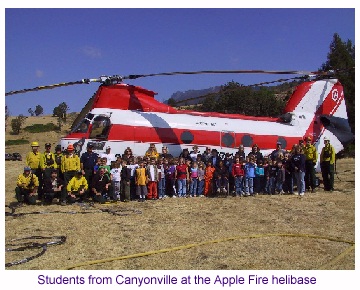 Farther south on the Umpqua National Forest, the 17,600-acre
Farther south on the Umpqua National Forest, the 17,600-acre  This will be the last day for the firefighters from Australia and New Zealand who have been working on the Apple Fire and Tiller Complex; they will begin their trip home tomorrow.
This will be the last day for the firefighters from Australia and New Zealand who have been working on the Apple Fire and Tiller Complex; they will begin their trip home tomorrow.
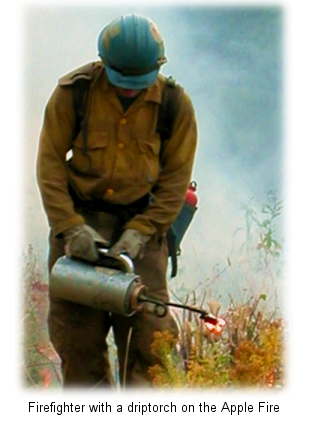 The fire, which started on August 16, has been burning in steep, rugged terrain and heavy timber east of Glide on the Umpqua National Forest.
The fire, which started on August 16, has been burning in steep, rugged terrain and heavy timber east of Glide on the Umpqua National Forest.
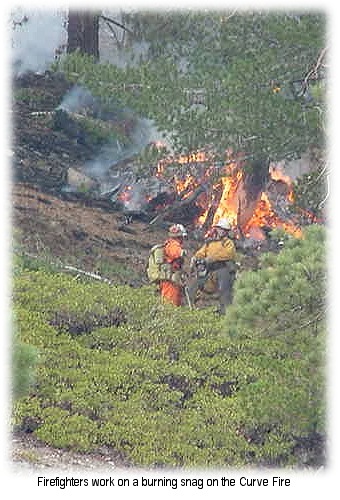 "We had a little drizzle, and with the clouds that definitely slowed the fire down," said Linda Steinberg with the Forest Service.
"We had a little drizzle, and with the clouds that definitely slowed the fire down," said Linda Steinberg with the Forest Service.
 SEPTEMBER 07 -- PALMDALE, CA: Cooler temperatures helped firefighters contain the 5,100-acre Leona Fire near Leona Valley in northeast Los Angeles County yesterday; the San Diego
SEPTEMBER 07 -- PALMDALE, CA: Cooler temperatures helped firefighters contain the 5,100-acre Leona Fire near Leona Valley in northeast Los Angeles County yesterday; the San Diego 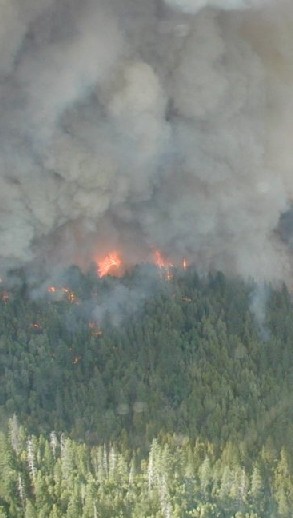 The
The 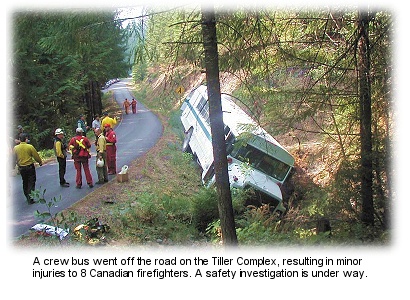 Two vehicle accidents occurred yesterday; eight firefighters received minor injuries — ranging from neck strain to concussion — when a crew bus on the Tiller Complex left the road. All eight were evaluated and then released from the hospital; five are assigned to light duty for up to a week. A watertender on the Apple Fire rolled over on a narrow road yesterday afternoon; the driver received only minor injuries. The watertender is being righted and retrieved today. Investigations on both incidents are under way.
Two vehicle accidents occurred yesterday; eight firefighters received minor injuries — ranging from neck strain to concussion — when a crew bus on the Tiller Complex left the road. All eight were evaluated and then released from the hospital; five are assigned to light duty for up to a week. A watertender on the Apple Fire rolled over on a narrow road yesterday afternoon; the driver received only minor injuries. The watertender is being righted and retrieved today. Investigations on both incidents are under way.
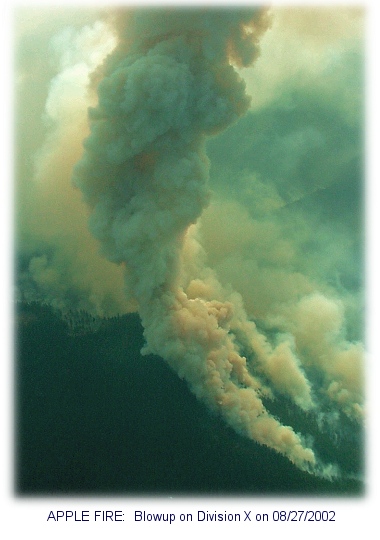 The fire yesterday spotted over the line on the east side of the fire, but night shift crews found and contained the spot fires. Today's crews will scout for and mop up those areas.
The fire yesterday spotted over the line on the east side of the fire, but night shift crews found and contained the spot fires. Today's crews will scout for and mop up those areas.
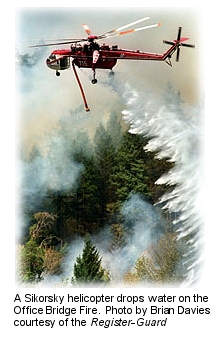 Three helicopters and three fixed-wings flew for most of the day, dropping water and retardant on the fire. According to the Eugene
Three helicopters and three fixed-wings flew for most of the day, dropping water and retardant on the fire. According to the Eugene 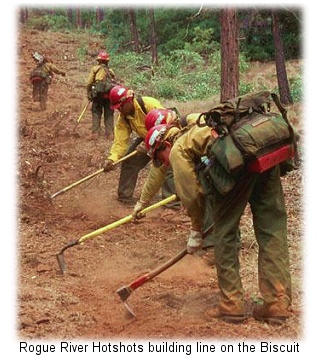 Researchers at the University of Montana and Montana University have been studying the physical strains on firefighters, according to an
Researchers at the University of Montana and Montana University have been studying the physical strains on firefighters, according to an